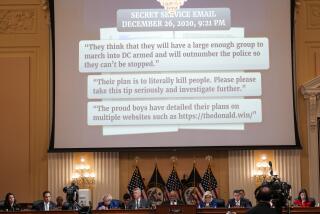CIA ‘Plan’ Helped Foil Terror Plots
- Share via
WASHINGTON — In a world of cloak and dagger, one of the CIA’s most secret campaigns was called simply “the Plan.”
For two years before the Sept. 11 attacks, it was the official operational strategy that the CIA, the FBI and other U.S. agencies jointly adopted for their clandestine -- and still largely unsuccessful -- campaign to capture terrorist Osama bin Laden and his chief aides.
CIA Director George J. Tenet described “the Plan” publicly for the first time Thursday during hearings in which he battled with lawmakers over his agen- cy’s effectiveness leading up to the Sept. 11 attacks.
He insisted that the covert war had successfully foiled a series of previously undivulged terrorist plots against Americans at home and abroad.
Tenet said U.S. intelligence and law enforcement had helped thwart three separate waves of attacks by Bin Laden’s followers in Europe, the Middle East and Asia between the fall of 1999 and Sept. 11, 2001.
One foiled plot included the use of chemical weapons, Tenet revealed, while others involved hijackings, kidnappings and bombings of hotels, airports, buses and other targets.
The CIA also helped secretly deliver 70 suspects to foreign governments, a process known as “renditions” that human rights groups say tacitly permits the use of torture. Among the weapons seized: antiaircraft missiles.
“It saved lives -- perhaps in the thousands,” Tenet said of the hitherto hidden effort. “And it prepared the field for the rapid successes in Afghanistan last winter.”
Tenet provided the rare look at the CIA’s covert counter-terrorism war as part of his testimony before the joint congressional panel that is investigating the Sept. 11 attacks.
Some committee members, staffers and witnesses have sharply criticized the CIA in previous hearings for failing to aggressively pursue Bin Laden and his terrorist network.
Tenet also provided new details of Bin Laden’s direct role in the Sept. 11 plot. Noting that planning for the attack began three years earlier, he added, “we understand that when one of his associates proposed to Bin Laden that the World Trade Center be targeted by small aircraft packed with explosives, Bin Laden reportedly suggested using even larger planes.”
Although the CIA initially regarded Bin Laden as a financier of terrorism, he came into focus as a more direct threat after his support was confirmed in attacks on U.S. military forces in 1992 in Aden, Yemen, and again the next year in Mogadishu, Somalia, Tenet said.
Concern intensified when the CIA learned that Al Qaeda, the terror network started by Bin Laden, “had attempted to acquire material used in pursuing” weapons of mass destruction and had hired a Middle Eastern physicist to work on nuclear and chemical projects in Sudan.
The CIA set up its “Bin Laden Issue Station,” known internally as “Alex Station,” at its Virginia headquarters in 1996 after Bin Laden moved to Afghanistan, and stepped up its effort after Bin Laden’s followers bombed two U.S. embassies in East Africa in 1998.
In 1999, Tenet said, he asked for a “new comprehensive operational plan of attack” against Bin Laden and his network. “Its priority was plain,” he said, “to capture and bring to justice Bin Laden and his principal lieutenants.”
As part of “the Plan,” the CIA made greater use of informants and spies than in the past. Reports from such sources, known as human intelligence, or “humint,” rose from about 600 in 1998 to 900 in the first nine months of 2001, Tenet said.
The first fruits of the plan came in late 1999 when the CIA warned U.S. policymakers that Bin Laden operatives planned from five to 15 attacks against U.S. and allied targets during the millennium celebrations. Luck played a role: A plan to bomb Los Angeles International Airport and other targets was detected when Ahmed Ressam panicked and was arrested at the Canadian border.
“We mounted disruption and arrest operations against terrorists in eight countries on four continents, which also netted information that allowed us to track down even more suspected terrorists,” Tenet said.
Among the plots disrupted was a major terrorist cell in Jordan that had planned to blow up a Radisson Hotel, Christian holy sites and Israeli tour buses “and that had plans to use chemical weapons,” Tenet said.
The CIA has not previously claimed that Bin Laden operatives had specific plans for chemical weapons. A former senior U.S. counter-terrorism official said several cells were known to have considered using industrial-strength chemicals and other means to poison water supplies in tourist areas.
The senior official confirmed that the CIA warnings at the time made officials all the way up to the senior White House level “screwed to the ceiling with fear.”
“For people working counter-terrorism prior to 9/11, the millennium alert was a seminal event,” the official said. Tenet “was driving the train on the millennium response. He put his whole operation on battle stations and he cashed in every chit that he had.”
U.S. and allied governments averted a second wave of potential attacks during the Muslim Ramadan period in November and December 2000, or shortly after Al Qaeda operatives had bombed the U.S. destroyer Cole in Yemen, killing 17 U.S. sailors, Tenet said.
“Terrorist cells planning attacks against U.S. and foreign military and civilian targets in the Persian Gulf region were broken up, capturing hundreds of pounds of explosives and other weapons, including antiaircraft missiles,” Tenet said.
He said the Ramadan arrests and operations “also netted proof that some Islamic charitable organizations had been either hijacked or created to provide support to terrorists operating in other countries.”
The third “peak threat” period, Tenet said, was in the spring and summer of 2001. The National Security Agency, for example, obtained more than 30 warnings from electronic eavesdropping and other means that “something was imminent,” said Lt. Gen. Michael Hayden, the NSA chief, who also testified before the committee.
But none, Hayden said, contained details of the coming attacks on New York and the Pentagon, or suggested that four passenger airplanes would be used as weapons. Indeed, none of the intercepts “subsequently correlated with terrorist attacks.”
The increased attention paid significant other benefits, however. Tenet said U.S. authorities “stopped some attacks and caused the terrorists to postpone others,” as he revealed a series of covert operations for the first time in public.
He said the CIA helped break up another terrorist cell in Jordan and seized a large quantity of weapons, including rockets and high explosives. A separate operation, he said, “broke up a plan to attack U.S. facilities in Yemen.”
In June 2001, he said, the CIA and a Middle Eastern government arrested two Bin Laden operatives planning attacks “on U.S. facilities in Saudi Arabia.” Other CIA operations helped delay several terror plots, he said, “including an attack against the U.S. military in Europe.”
Another Middle Eastern government, he said, helped arrange the detention of “a terrorist who had been directed to begin an operation to attack” a U.S. embassy or cultural center in Europe. A separate arrest with CIA help, he said, netted “an operative described as Bin Laden’s man in East Asia.”
A CIA handing-over of “a senior Bin Laden associate” to an unnamed government, he said, proved critical when “information he provided included plans to kidnap Americans in three countries and carry out hijackings.”
Still, he added, the CIA expected much worse.
“In the months leading up to 9/11, we were convinced Bin Laden meant to attack Americans, meant to kill large numbers and that the attack could be at home, abroad or both,” Tenet said. “Our collection sources ‘lit up’ during this tense period. They indicated that multiple spectacular attacks were plan- ned, and that some of these plots were in the final stages,” he added.
He said the intelligence, however, was “maddeningly short on actionable details,” such as time or place. “We considered whether Al Qaeda was feeding us this reporting, trying to create panic through disinformation, yet we concluded that the plots were real.”
In the end, he said, “the Plan” helped the CIA and other agencies respond quickly after the Sept. 11 attacks, both in Afghanistan and in rolling up terror cells around the world.
Tenet said authorities have arrested 3,000 suspects around the world, far more than previously disclosed. The arrests have provided “real-time intelligence collection [that] is an order of magnitude different than it was before 9/11,” he said.
But he ended with a warning. “Based on what we have learned about the 11 September plot, an attempt to conduct another attack on U.S. soil is certain,” he said. “Even with the increased government and public vigilance ... the danger is still great.”
More to Read
Sign up for Essential California
The most important California stories and recommendations in your inbox every morning.
You may occasionally receive promotional content from the Los Angeles Times.














